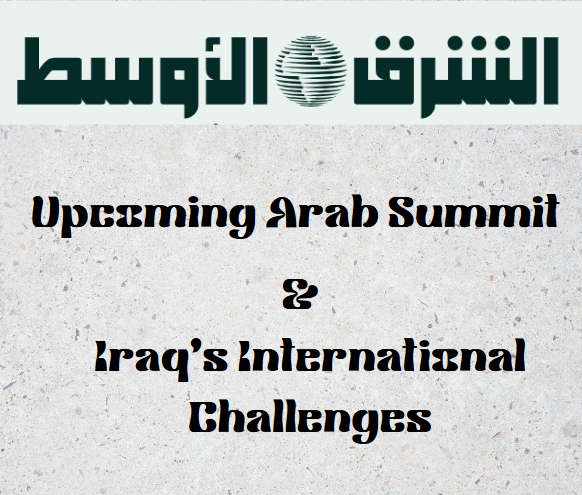A large-scale beautification drive is underway these days in Baghdad, the capital of Iraq. This is in preparation for the upcoming Arab Summit which it will be hosting (on May 17). Huge sums of money have been received by it to clean and beautify the areas of the city that will receive the leaders of the Arab states. This summit is being held in the time of massive regional and international sensitivities, which make it the focus of observers and political analysts at the local and regional levels.
It is necessary for Iraq to regain its prestigious position in international forums, and to return strongly to the regional and global arena. Iraq, due to its ancient history, strategic position and enormous natural resources, is a country with political and economic weight that qualifies it to be a major and influential player in the region and the world. The hosting of the Arab Summit is an important step in the direction of restoring this central role.
There is no doubt that the world, specifically the Middle East, is in dire need of such leadership meetings and high-level diplomatic talks in view of the current challenges. But the questions remain: What are the expected outcomes of this summit? And what are the benefits that Iraq will gain from its hosting? This is particularly when there is a possibility that some Arab leaders will not attend it due to various reasons which may be political, judicial or security.
The fundamental question which arises now: Is the success of the Iraqi political leadership in dealing with chronic internal problems before turning to hosting a regional event of this magnitude? Isn’t it logical and reasonable to focus efforts first on addressing the intractable local challenges that directly affect the lives of Iraqi citizens?
Iraq today faces urgent internal challenges which require swift and effective treatment, including the oil crisis in the Kurdistan region. The obstruction in the supply of oil from the region constitutes a severe economic crisis affecting the country’s resources. There is a problem in the currency and the banking system. The Iraqi currency suffers from severe fluctuations. There are problems faced by Iraqi banks, which have a negative impact on citizens and businessmen alike.
There is a chronic electricity crisis. This is despite Iraq’s being one of the richest countries in the region in terms of natural resources. Iraq still suffers from a severe shortage of power supply. Although the country has huge reserves of natural gas, this precious resource is wasted without proper utilisation in the operation of power plants and meeting the needs of citizens.
The unity at the internal level is the main pillar of any successful external movement. How can Iraq protect itself from external ambitions in the face of deep internal divisions?
It is important now that the federal government, before holding the Arab summit, convenes an inclusive and comprehensive national dialogue conference. It should be participated by all relevant political and social forces to address internal problems and find their effective solutions as soon as possible.
The success of the Arab summit depends on the accomplishment of the internal national dialogue. The strength of hosting such regional conferences does not lie only in external appearances and lavish spending on beautification and logistical arrangements, but in the ability of the host country to provide a successful model for stability and internal unity.
[by Hamdy Singary in Asharq Al-Awsat]
Compiled and translated by Faizul Haque




